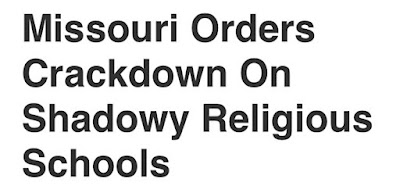KBIA
September 23, 2021
Beginning Oct. 1, unlicensed religious boarding schools in Missouri must notify the state they are operating as part of an attempt to address abuse and neglect at the often shadowy facilities.
Under a series of emergency rules filed this week by the Missouri Department of Social Services, the schools also will have to begin fingerprinting employees in order for the state to determine if workers are sex offenders or have other criminal records.
“The background checks are being conducted to help ensure that certain individuals who are associated with these facilities do not have a record of criminal conduct or substantiated incidents of child abuse or neglect which may pose a risk to the children served at these facilities,” the new rule says.
The filing of the rules is the latest step in a series of actions by state lawmakers and local law enforcement agencies to shed light on more than a dozen reform schools that operate in the state. The schools have not had state oversight for four decades under a law that exempts faith-based facilities from regulation.
The 1982 law also said DSS is prohibited from requiring the schools to prove they should be exempt.
Rep. Keri Ingle, D-Lee’s Summit, who co-sponsored the new law, said in an interview Wednesday she was encouraged by the speed with which the state is implementing the legislation.
She said the state hasn’t had a clear picture on how many unlicensed facilities are operating in Missouri.
“Which is terrifying,” Ingle said. “This just brings everything out into the light.”
Ingle, who worked with Rep. Rudy Veit, R-Wardsville, on the legislation, said “the most important part of this is making sure that people who have access to kids have background checks, and that they’re doing those as quickly as possible.
“We want to make sure that people who are caring for the most vulnerable kids in the state of Missouri … don’t have a history of perpetrating crimes against those very children or other vulnerable populations,” she said.
The crackdown on the homes came after months of legislative hearings this spring, including emotional testimony from former students at the schools.
James Griffey, who was a student at Agape in the late 1990s, testified to a Senate committee that he was physically assaulted on his first night at the school when he couldn’t perform all the exercises he was ordered to do.
What emerged from the House and Senate was a law requiring the schools to notify the state they exist. It also sets some minimum health and safety requirements, including mandating background checks for employees.
The law requires adequate food, clothing and medical care for children and says parents must be allowed access to their children at any time without prior notice. It clarifies the process for investigating reported abuse and potentially shutting down bad actors.
The new rules order the schools to provide detailed information about their operations, including floor plans, budgets, staffing plans and “written identification of specific program models or designs which shall include the methods of care and treatment to be provided.”
The schools could be shut down or their students removed if they fail to comply with notification and health and safety inspections, or if a facility is suspected of abuse or neglect.
The new law bars government agencies from regulating the content of a school’s curriculum.
In publishing the new rules, regulators said “immediate action is necessary to protect children, and it was necessary for the immediate preservation of the public health, welfare, peace and safety.”


No comments:
Post a Comment